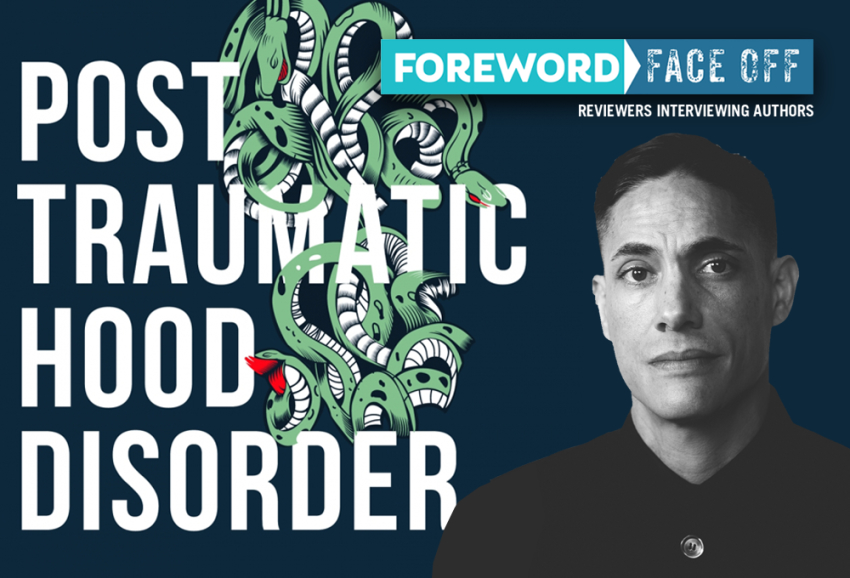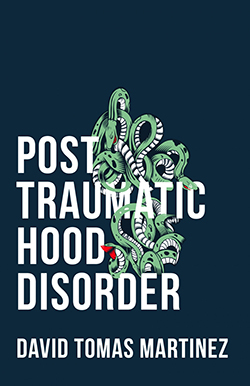Interview with David Tomas Martinez, Author of Post Traumatic Hood Disorder

Reviewer Camille-Yvette Welsch Muses with Poet David Tomas Martinez, Author of Post Traumatic Hood Disorder
At Foreword, we love indie books from all genres—just as we love other edgy, indie-type stuff like oysters, foie gras, Roquefort ice cream, and even raw frozen reindeer in Russia once. Seriously. No joke.
Actually, that’s not quite 100 percent true. We don’t love all genres equally—we’d spurn business books and biographies in a heartbeat to spend more time with poetry. Yes, poetry flutters our heart flutterer and makes us swoon.

And when we find something special, like David Tomas Martinez’s Post Traumatic Hood Disorder, you can count on us to let you know.
Here’s what Camille-Yvette Welsch had to say about his collection in her review for Foreword’s March/April issue: “The draw here is Martinez’s mode of storytelling. His lines are sharp and musical, deftly split and carefully crafted. … Machismo butts up against tenderness, regret against ambition—always with musicality and attention to what forms on the page. … Martinez melds an urban background, a modernist’s attention to precision, and a rapper’s flow to form an irresistible collection of contemporary poetry.”
So, Foreword This Week fans, this week we have Martinez and Yvette-Welsch together for a Face Off interview—if you’re looking for insight from a poet at the top of his game, you won’t want to miss this one.
Special Features and Featured Reviews are just past the interview.
What was the gateway poem that got you started with poetry? What would you suggest as a gateway for people, especially teens, interested in poetry? Can you suggest one of your own and one from another author?
The first poem that really engaged me, that wrestled me down, made me cry uncle, is an odd one considering that I was in my third or fourth semester of college (though credit-wise I was still a freshman) and the poem was sophisticated in ways I couldn’t, wouldn’t understand then). It was an important moment: I sat in the library with someone I adored, when turning to me, they said, I just found the most amazing poem. You should read it.
It was T. S. Eliot’s “The Love Song of J. Alfred Prufrock.” I didn’t process the poem in any erudite manner as much as I just got the poem, not the meaning per say, but the poem, experienced it via sound and fragments of poetic image, a layer of comprehension for poems that continues to be a viable source of enjoyment for me, though now I’ve come to highly value the production of a cognizant and aware thought process within poems as well, of work seeking contiguous ground with the reader, of poems particularly interested in perception. Plus, the first sentence of “Prufrock” is a remarkable feat of simile, has an engaging declarative-opening phrase that embeds an allusion to Dante’s Virgil character; it establishes a maintained beauty of rhythm and sound, and localizes time-space inside a poem that relies on dreamscape and surrealistic aesthetics. It is birth-level amazing.
While the totality of Prufrock kept itself unmeaninged, there was a trope, a figure, I recognized in the poem: Prufrock is the “old man in the club,” the mood of the time and the current sway of style all elude the speaker, are completely out of context, making him conspicuous. Even at 21, I could appreciate this tragedy.
As far as what could be a first love, for somebody else, maybe, “Winter Stars” by Larry Levis? “Daddy” by Sylvia Plath? I love both of those poems. I’m not sure I’ve written a poem, yet, that would hook any neophyte to poetry; I feel least qualified to answer that question. I’ve always loved “Lucky” by Tony Hoagland, a sophisticated and super-dark poem, but narrative and highly evocative, which are much more immediate elements for early readers of poems.
You talk a lot about masculinity and its expectations in both books, Hustle and PTHD. Have your ideas about masculinity changed between the writing of the books? Also, how do they interact with your ideas about poetry and its series of expectations?
Hell yeah. I was reared in a fairly customary family adherent to a hierarchal masculine society, and while I was aware of the insidiousness of masculinity, I think my idea of masculinity, as a totality, was much flatter in Hustle than in PTHD. Forever always, the first step is recognizing a problem, but for a better understanding, any chance at reconciliation, acceptance is needed. I think too many of us are ensnared in the condemnation of a system or idea without the possibility of acceptance. This is a problem: chaos inside, chaos outside. Gender, race, sexuality, religion, or any of the boxes we use to identify aren’t the problem, as much as our use of them to create gradations, solidify hierarchies. In this way, even “change” can be used to create more hierarchies, which isn’t my hope or goal.
Masculinity, and by proxy misogyny, is just one station of interest for me. As are homophobia and racism, topics engaged in both Hustle and PTHD, but ultimately I’m interested in stripping the psychological, emotional dependency of coping filters on my “reality.” In other words, I’m looking to extricate the bullshit and false enthusiasms from my life. I use making poems as a structure to my day-to-day life, hoping for a more easily reached existence, and I hope that helps other folks too. My real issue with systemic prejudices is that they impede truth, focus on a too narrow way of being. When will a particular dominance attributed to an arbitrary genetic quirk go the way of flat earth theory? Sorry not sorry to the Kyries, Ryans, et al. Though the difficulty with truth comes when we ask it to be extricated from personal desire, which is arguably impossible. Not-woot. So, I think that my poetry begins taking shape, when successful, somewhere in that nether region in self-imaging what I currently am, who I want to be.
Attempting to anticipate readers’ expectations is a big part of my aesthetic, both thematically and syntactically. It’s how I create tension, resolution in my poems. So far, I think I’ve done an adequate job. Though, I’m amazed how anyone can write more than a few books, and I understand now, having authored two books and starting a third, why so few books fully entice me into their world. Spoiler alert, writing books is horribly hard, and I’m considerate of every book out there. I am a true believer of of or in? poetry.
Your title Post Traumatic Hood Disorder is playful and deadly serious at the same time. What was your intent with this title? How does it create a lens through which you want readers to view the poems?
I was hoping that Post Traumatic Hood Disorder as a title could encapsulate the multiple themes of the book. On the one hand, hood is homage to the ‘hood, my urban background and story. On the other hand, it’s also an existential statement about mutable elements of being and identity. This greater philosophical sense of hood becomes more encompassing as the book progresses. Though I’d argue even the physical sense of ’hood in the beginning of the book is imbued with a bachelardian poetics of space. There are also hoods as masks throughout the book. There are all types of hoods, and I wanted the book to reflect this multi-dimensionality.
Often beginning writers are scared of acknowledging their literary kin. They worry about having their own unique voice. Your literary kin make frequent appearances in your poems. How and why are they vital to your writing?
I understand the hesitancy to acknowledge your debts as a writer; however, language and thought are not created in a vacuum. Poetry is, as they say, a great conversation. I’m hopefully contributing. The first poet I loved was Emily Dickinson. Then Robert Frost. Then a huge Gerard Manly Hopkins phase, followed by a huger Whitman phase. Next, I went through a meditative phase with Stevens. Then a direct-language phase with Williams Carlos Williams. Then Gwendolyn Brooks, trailed by Larry Levis. In some ways, Levis stills looms the largest. Then came Derrida. Then Tomas Tranströmer. I’ve continually been in the debt of Gabriel Garcia Marquez’s One Hundred Years of Solitude. That’s a forever nook.
Living poets I adore: Yusef Komunyakaa, Louis Glück, Rita Dove, Terrance Hayes, and Campbell McGrath. Most importantly, I must acknowledge my lineage: Gloria Anzaldua, Corky Gonzales, Sandra Cisneros, Luis Valdez, Juan Felipe Herrera, Cherie Moraga, Rigoberto Gonzalez, Lorna Dee Cervantes, Richard Rodriguez, Luis Alberto Urrea, Victor Villasenor, Juila Alavarez, Martin Espada, Junot Diaz, and all the Latinxs that made space for me and my cohort. They have been truly vital to my writing.
Okay, so we were given the go ahead to have a little fun, so I have a question that I thought about while I was reading your work. Let’s imagine you are suddenly a producer as well as a poet and you also can raise the dead. Your mission is to pair a poet and a rapper and produce something. You get two pairs, and two different types of production. Who are your pairs and what would they create? Bonus points for titles.
I love rap, hip-hop, or whatever you want to call it. Run-DMC & The Beastie Boys were my first tapes. I grew up on the music, and it’s still a large part of my identity, but I’m going to go a little broader. I’d love to see Miles Davis and William Shakespeare collaborate. Bitches Brew is already a Davis-Shakespeare love child, no? Besides jazz was the rap of its time.
I think trap music, particularly the so-called “mumble rap” contingent, lines a direct decent of sapphic influence by way of fragmentary narrative, and maybe even more so, the em dash and intermingling of private, public language of Emily Dickinson. Tangentially, Kendrick’s “Untitled” uses a dickinsonian numerical titular system, coincidence? Yes, but I can see the carry over with this, so I’d put Migos & Gertrude Stein together and call it, Tender But-ins.
Wait, wait, wait, how about a John Donne/Nicky Minaj duo? That’s a “Love Jam” waiting to happen. Kanye West and Lord Byron are twins, and I’d love to put them together, call it, Lordz?
And what about a Marianne Moore & Jay-Z combo? Both have an interesting mix of diction choice, but I think their use of irony and posed personas would complement each other well. Plus, they both have a very general, flatly universal collection-naming tick. So I’d just call it “Collaboration.”
Finally, I’d put Larry Levis and Kendrick Lamar together, two major figures of the West Coast, with so much versatility and skills. I’d call the collaboration Winter Scars.
Camille-Yvette Welsch
